
1. Introduction
In the rapidly evolving world of retail, the emergence of Artificial Intelligence (AI) has marked a new era of innovation. Businesses can now access these technologies at an affordable rate and with abundant application options. By equipping these new tools, businesses can boost operational efficiencies and achieve cost savings through automated processes and precise tracking of transactions. More importantly, this enables them to engage more deeply with their customers. Such engagement is essential for refining marketing strategies, enhancing sales techniques, and building stronger consumer loyalty on the retail front. This article delves into how AI is transforming the retail sector, enhancing marketing approaches, optimizing pricing strategies, improving shopping experiences, and promoting sustainability. It draws on real-world applications and theoretical insights to demonstrate AI's pivotal role in retail innovation. Through its multifaceted applications, AI is proving to be indispensable in helping retailers adapt to and thrive in the digital age.
2. AI-enhanced Precision Marketing: Tailoring Customer Interactions
One of the common challenges for brands is ensuring that their marketing investments effectively attract new customers and enhance sales conversions. Traditionally, this has been complicated by difficulties in how to tailor the content for diverse consumer segments and how to measure the effectiveness of return on investment. However, with the advent of AI, we are witnessing a transformation in marketing paradigms using big data analytics, which is capable of not just understanding consumer demographics such as location, gender, and age but also predicting complex behaviors like preferences, purchasing habits, and interest in products or services. This predictive capability allows AI to craft personalized communication strategies that align a brand’s values and offerings with individual customers' needs.
The figure below illustrates how AI enhances the precision of marketing throughout the shopping journey. Utilizing sophisticated camera systems, machine learning algorithms can identify customers as soon as they enter the store. Upon passing authorizations, AI immediately taps into their profiles and historical purchase data, which helps predict buying behaviors. Marketing messages, tailored to individual preferences, are then delivered through various channels such as sales assistants wearing AI-powered devices, digital interactive displays near products, or direct text messages to customers' mobile phones. This strategy demonstrates how AI could significantly boost customer engagement and improve sales conversion rates.
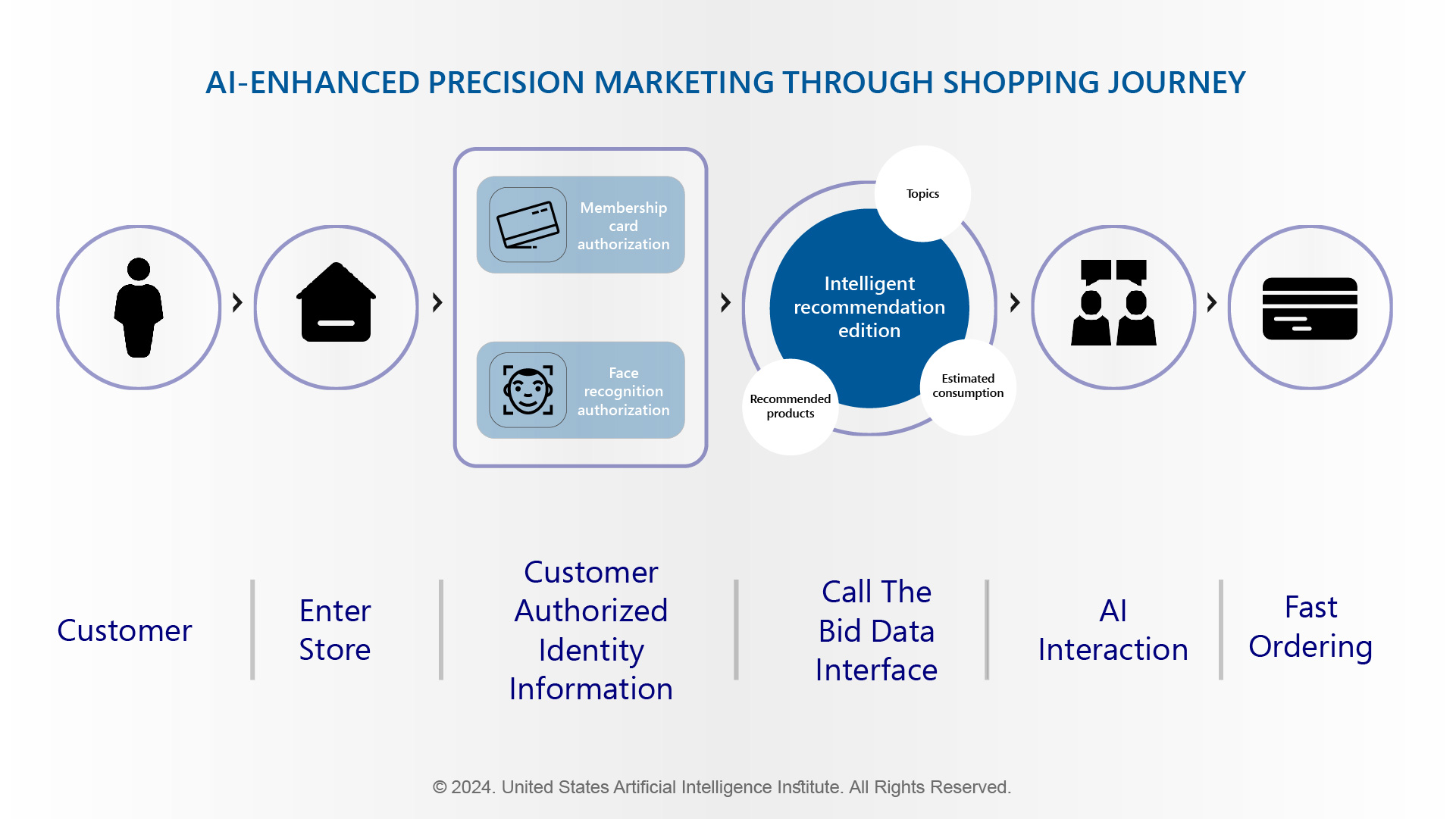
One example is Starbucks. The company utilizes AI to sift through extensive datasets from its mobile app, which tracks user interactions, purchasing history, and social media activity. This data informs personalized marketing strategies that significantly enhance customer interaction with the brand, fostering both satisfaction and loyalty.
For optimal utilization of AI-driven marketing, companies should invest in robust data analytics infrastructures and train their teams to use AI-generated insights effectively. The focus is on aligning the brand's value message, language, and communication methods with micro-categorized consumers. Collaborating with retail partners to seamlessly integrate these tools in-store is crucial, as it requires a blend of technological integration, ongoing systemic refinement, and staff training.
3. AI-powered Dynamic Pricing: Boosting Sales and Satisfaction with Real-Time Adjustments
In today's digital marketplace, consumers have the power to quickly compare prices across brands at the touch of a button. This change has made traditional pricing management practices, such as periodic pricing updates, less practical from a market competitiveness perspective. Many businesses are starting to adopt AI-powered dynamic pricing. The figure below highlights how advanced AI systems, running on neural networks and deep learning algorithms, analyze and interpret datasets from diverse sources such as market trends, consumer behavior, and external influences like weather conditions or significant events.
Dynamic Pricing Framework of Retail
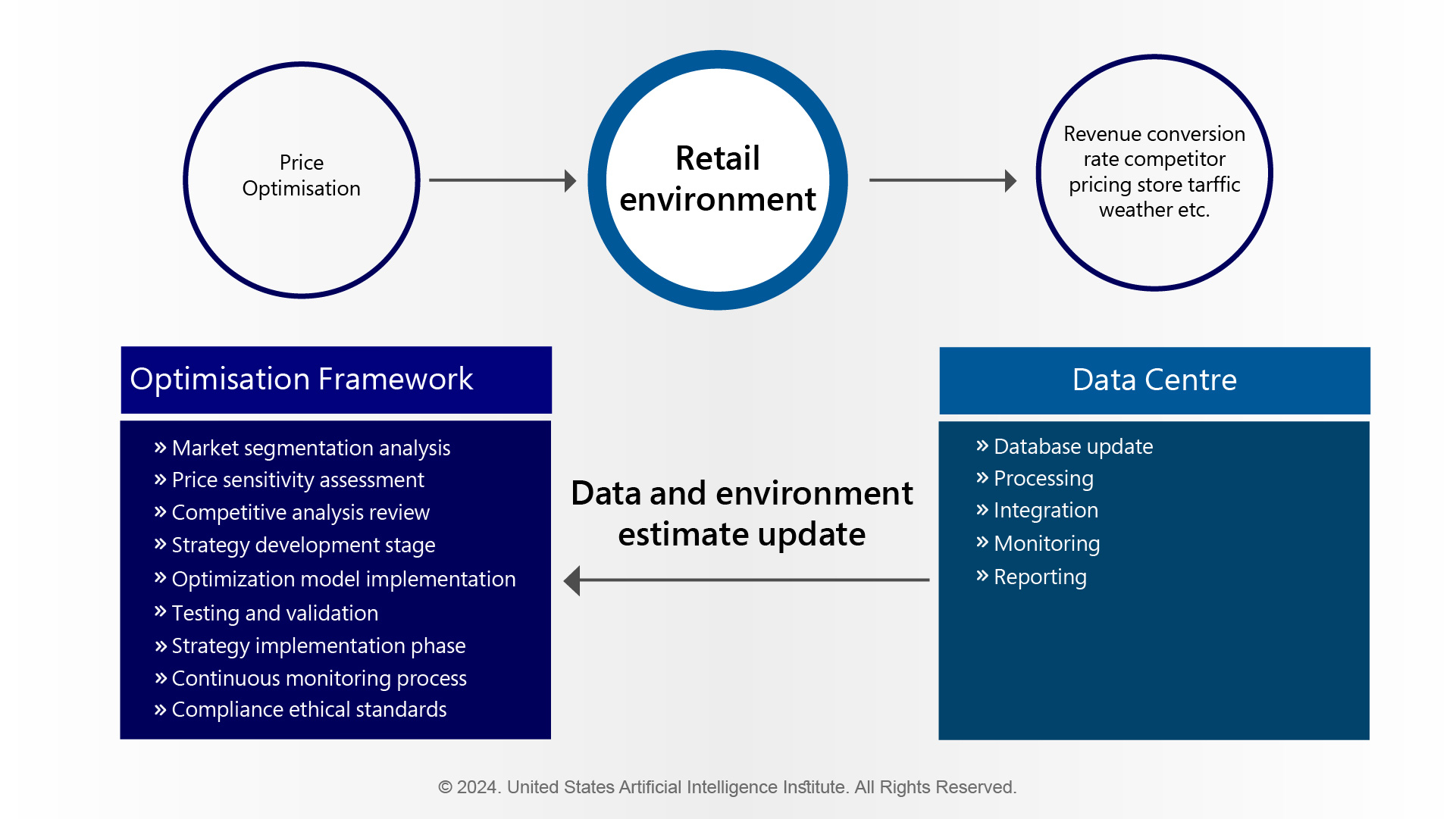
The essence of dynamic pricing lies in its ability to make real-time adjustments based on current market conditions. AI tools help companies swiftly modify their pricing strategies in response to fluctuations in demand and supply, especially when reacting to competitors’ pricing and market activities. This flexibility not only maximizes profitability but also ensures that pricing remains competitive and meets consumer expectations. For instance, Amazon utilizes AI-driven dynamic pricing to make instantaneous price adjustments, optimizing both sales and customer satisfaction by responding agilely to changes in the market. The closed-loop setup enables continuous monitoring and adjustment of prices to support sales.
Furthermore, the implementation of dynamic pricing demands rigorous adherence to ethical standards and regulatory compliance. AI systems must conform to legal frameworks such as the Fair-Trading Act 1986 and the Commerce Act 1986, ensuring that pricing practices are equitable and do not foster anti-competitive behavior. It is important to use a supervised learning model for this pricing strategy, ensuring a balance between AI-generated insights and human expertise for sensor checks, to uphold business ethics and contractual obligations regarding when prices can be legally changed.
4. Customization at Its Core: AI in Enhancing the Shopping Experience
The retail sector's future hinges on the personalization of the shopping experience. With the continuous advancement of AI and manufacturing technologies, mature markets now find themselves in an era where there is no shortage of product innovation and manufacturing capacity. For brands looking to expand, success will increasingly depend on cultivating customer loyalty and securing repeat purchases. In this context, employing AI technologies to tailor the shopping experience becomes indispensable. The figure below illustrates various AI applications throughout the buying journey for both e-commerce and physical store management.
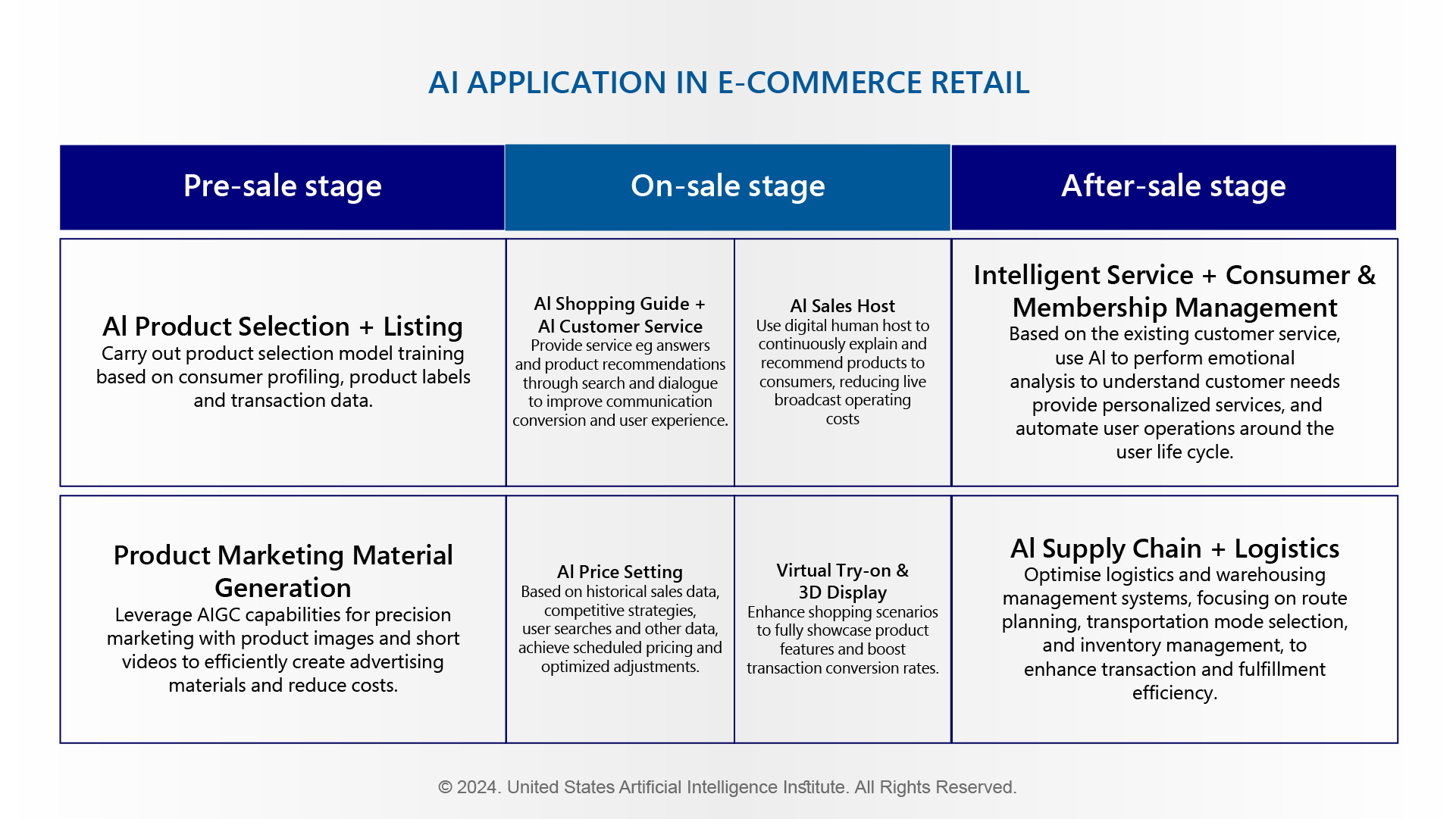
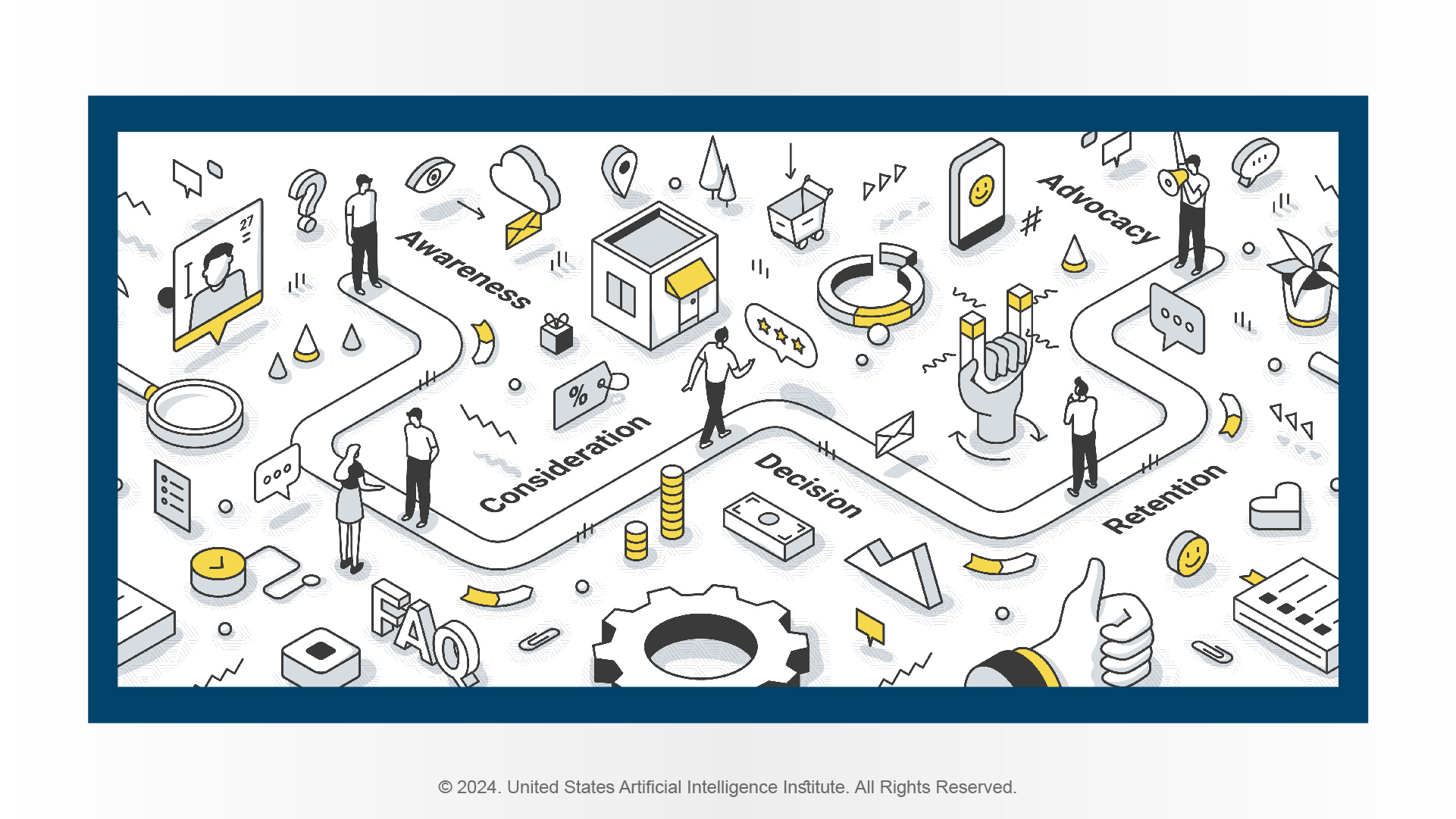
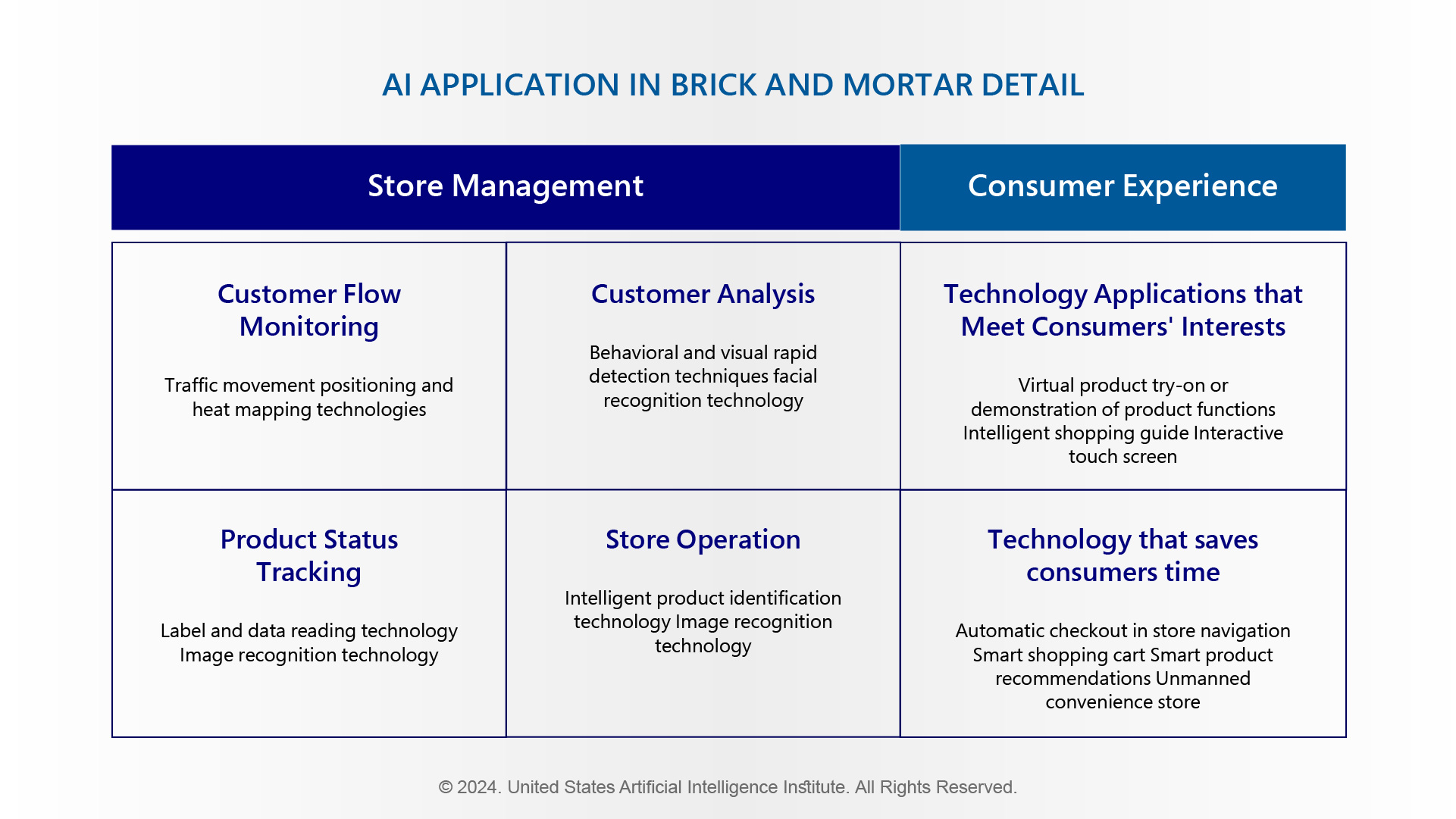
The integration of AI into customer service must be approached with sensitivity to preserve the human element. Retailers need to strike an optimal balance between automated services and human interaction to ensure that while operational efficiency is enhanced, person-to-person interaction for customer satisfaction remains paramount. Retailers must adopt AI technologies that enhance rather than detract from customer interactions and equip their staff with the skills needed to effectively utilize these technologies. It is also essential to implement robust feedback systems that allow for the continuous refinement of AI systems based on customer and employee feedback.
5.AI Driving Sustainability in Retail
The contemporary retail landscape is witnessing a paradigm shift towards sustainability, driven by technological advancements and heightened consumer awareness. AI is at the helm of this transformation, not only revolutionizing retail operations but also embedding sustainability deeply within them. The following figure shows the critical roles AI plays across various facets of retail, demonstrating how it fosters a sustainable business model that aligns with both environmental goals and consumer expectations.
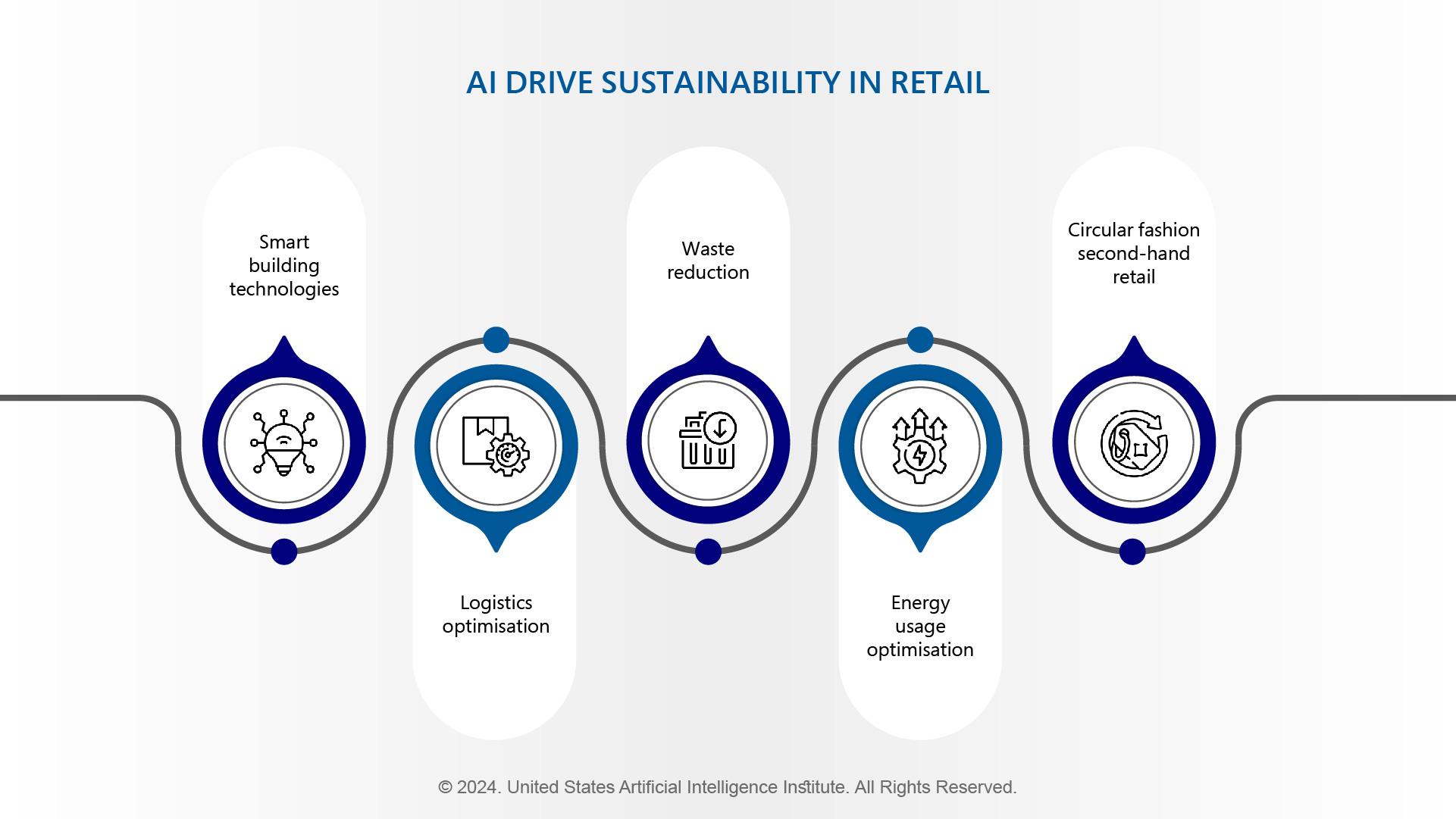
Energy management is a prime area where AI contributes significantly. By employing advanced forecasting algorithms, retailers like Target effectively manage their energy usage, tailoring heating, ventilation, air conditioning (HVAC), and lighting according to real-time store conditions. This targeted energy use significantly cuts down on waste, reducing both costs and environmental impact.
Innovations in smart building technologies also reflect AI’s capabilities. Retailers such as IKEA integrate AI with systems like LED lighting and solar power to boost their efficiency. This synergy not only reduces dependence on non-renewable energy sources but also underscores a commitment to reducing the operational carbon footprint, setting a benchmark in sustainable retail practices.
Waste reduction is another critical area benefiting from AI. By leveraging predictive analytics and machine learning, retailers can accurately forecast demand and adjust inventory accordingly. This approach minimizes overstock and reduces waste, as evidenced by Burberry’s use of visual AI to fine-tune inventory levels and avoid overproduction, thereby mitigating textile waste.
AI extends its influence on logistics, optimizing the entire supply chain from warehouse management to delivery routes. This optimization not only ensures efficient use of resources but also lessens the environmental toll of logistics operations. Visual AI aids in this process by enhancing online merchandising strategies, which in turn optimizes stock levels and reduces the need for extensive warehousing.
Finally, AI is transforming the realm of circular fashion and second-hand retail. Visual AI technology enhances the shopping experience in second-hand markets by making product discovery quick and tailored. This not only promotes the reuse of garments but also supports a more sustainable consumption model, reducing the demand for new product manufacturing and encouraging more environmentally friendly purchasing behaviors.
Conclusion
AI is reshaping the retail sector, enabling precision marketing and dynamic pricing to dramatically enhance customer engagement and satisfaction. By harnessing extensive datasets, AI develops highly personalized marketing strategies that effectively refine the shopping experience and boost customer loyalty and sales.
Encouragingly, AI also assists retailers in reducing their environmental impact by optimizing energy consumption, reducing waste, and enhancing logistics efficiency. However, despite the advancements, retail remains fundamentally people-centric. We must maintain a balanced approach between AI-generated recommendations and human expertise, ensuring that the insights are judiciously applied in the real world to truly enrich both the consumer experience and the retail environment.
Follow us: